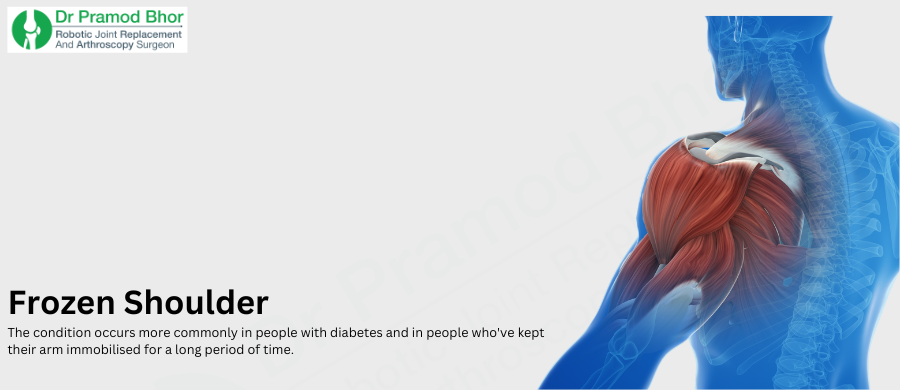
Frozen shoulder, medically known as adhesive capsulitis, is a condition that restricts the motion of the shoulder, causing pain and stiffness. It arises when the shoulder capsule thickens and tightens around the shoulder joint, limiting its movement. Understanding, diagnosing, and effectively treating frozen shoulder can significantly improve one’s quality of life. This guide combines practical advice with factual information, aiming to serve those seeking knowledge on frozen shoulder or looking for frozen shoulder treatment, especially in regions such as Navi Mumbai.
Symptoms of Frozen Shoulder
The primary symptoms include a gradual loss of mobility in the shoulder joint accompanied by pain and stiffness. The condition typically evolves through three stages: the freezing stage, where movement starts to become limited and painful; the frozen stage, where the pain might slightly decrease but the stiffness worsens; and the thawing stage, where the range of motion begins to improve.
Causes of Frozen Shoulder
The exact cause of frozen shoulder is not fully understood, but it is more likely to occur after the shoulder has been immobilized due to another injury or surgery. Factors that might increase the risk include diabetes, being over 40 years of age, prolonged immobility, and thyroid issues.
Preventing Frozen Shoulder
Maintaining shoulder mobility through regular, gentle exercises is key to preventing frozen shoulder, especially after injury or surgery. Proper management of pre-existing conditions like diabetes or thyroid disorders is also crucial.
Diagnosis of Frozen Shoulder
Diagnosis typically involves a physical exam and the doctor assessing the range of motion. Imaging tests like X-rays or MRIs might be required to rule out other conditions.
Treatment for Frozen Shoulder
Treatment focuses on controlling pain and restoring motion through a combination of medications, physical therapy, and in some cases, surgery. A frozen shoulder specialist in Navi Mumbai may recommend a tailored treatment plan, including specific exercises and possibly corticosteroid injections for pain relief. The role of a frozen shoulder orthopedic specialist is pivotal in managing severe cases that might require surgery.
Curing Frozen Shoulder Quickly
Fast recovery from frozen shoulder involves early detection, consistent therapy, and possibly interventions like injections or surgery for severe cases. Engaging in regular, specifically designed exercises and following the advice of a frozen shoulder specialist can expedite the healing process.
Managing Frozen Shoulder Arm Pain and Sleeping Comfortably
Managing arm pain involves using medications as recommended and applying heat or ice packs to reduce pain and inflammation. Sleep can be improved by using pillows for support and avoiding sleeping on the affected side.
Exercises for Frozen Shoulder
Gentle stretching and strengthening exercises can enhance mobility and decrease pain. Consultation with a healthcare professional is advised to recommend suitable exercises without exacerbating the condition.
FAQs for AC Joint Injury and Pain Treatment
What is the fastest way to heal a frozen shoulder?
Early and consistent treatment including physical therapy and interventions recommended by a frozen shoulder specialist can lead to faster recovery.
Can frozen shoulder be permanently cured?
Yes, with appropriate treatment, most people can regain almost complete shoulder mobility.
What activities should be avoided with a frozen shoulder?
Avoid activities that involve reaching out too far or behind you, which may exacerbate the condition.
Is heat or ice better for frozen shoulder?
Both can be helpful. Ice can reduce inflammation and pain, while heat may relax muscles and improve mobility.
How long does a frozen shoulder last without treatment?
The condition can last anywhere from a year to three years, but treatment can significantly shorten this duration.
